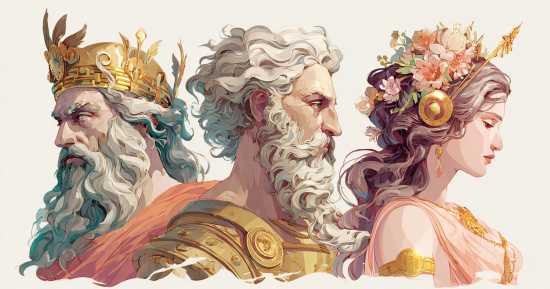Illuminated by tales of power and wonder, the Greek Mythology Gods and Goddesses Quiz uncovers a world where myth shaped identity and maybe even your future. These deities inspired awe and admiration, filling ancient temples, festivals, and poetry with stories that celebrated nature, wisdom, and strength. From the commanding presence of Zeus to the graceful intelligence of Athena, each god or goddess carried traits that influenced every corner of Greek life. They embodied ideals, guided human creativity, and reflected values that shaped culture for generations. Their myths became a cultural language, binding city-states together through shared heritage and vibrant tradition. Even today, their presence lingers in art, language, and imagination.
Festivals dedicated to these gods filled ancient calendars with music, athletic contests, and elaborate ceremonies. Communities honored Athena with grand parades in Athens, while Poseidon’s domain inspired coastal celebrations full of spectacle. Artists painted their likenesses onto pottery, sculptors carved their strength into marble, and poets composed epics that carried their stories across time. Their influence stretched beyond worship, fueling civic pride, artistic mastery, and philosophical thought. Through them, the Greeks transformed mythology into an enduring symbol of culture and identity and sometimes even what you wear.

This Greek Mythology Gods and Goddesses Quiz celebrates the creativity of a civilization that viewed storytelling as a bridge between the mortal and the eternal. Myths did not merely entertain; they educated, inspired, and united people under a shared cultural tapestry. Each tale reveals how the Greeks wove their values into divine narratives. These timeless figures continue to fascinate, inviting us to rediscover their power in every temple column and ancient verse. Their legacy remains one of beauty, intellect, and enduring human wonder.
Divine Figures And Cultural Symbolism
Zeus, ruler of the skies, embodied authority and order, setting an example for governance and justice in Greek society. His symbolism extended far beyond myth, influencing leadership and civic ideals. He represented the ultimate balance of strength and fairness that anchored their culture.
Athena, goddess of wisdom, inspired scholars and artisans alike. Her temples doubled as centers of thought, art, and civic life, blending devotion with education. Her image adorned coins, emphasizing her role in both economy and intellect.
Poseidon, master of the seas, reflected Greece’s deep connection to maritime trade and exploration. Sailors sought his favor, and his presence reinforced how myth and daily life intertwined seamlessly across the ancient world.
7 Serious Facts About Greek Mythology Gods And Goddesses
- Greek myths served as moral frameworks that reinforced civic values and social order.
- Temples to major gods functioned as community centers as well as places of worship.
- Homer’s epics introduced gods who intervened in mortal affairs, shaping literature permanently.
- Athena’s role as a patron goddess symbolized wisdom, civic unity, and cultural refinement.
- Zeus’s iconography influenced depictions of authority figures for centuries.
- Festivals for gods often included athletic games that became precursors to the Olympic Games.
- Many city-states adopted specific gods or goddesses as their protectors and cultural symbols.
Festivals And Artistic Legacy
The Panathenaic Festival celebrated Athena with grand processions, competitions, and offerings that brought Athens together in cultural harmony. These gatherings blended religion, civic pride, and artistic display into one shared event.
Dramatic performances often depicted the struggles of gods and mortals, filling amphitheaters with gripping tales. Playwrights wove lessons of morality and human nature through divine characters, connecting myth to personal reflection.
Pottery, sculpture, and architectural reliefs immortalized the gods. Every detail—from Zeus’s thunderbolt to Hermes’ winged sandals—preserved not only art but a vivid historical record of how myth lived in everyday life.
Enduring Influence Of Greek Myths
Myths provided frameworks for education. Teachers used these stories to explain abstract ideas, helping students learn through engaging and memorable narratives of gods and heroes.
They also shaped language itself. Modern expressions rooted in Greek mythology reveal how these tales became an inseparable part of cultural identity, transcending centuries and geography.
The gods and goddesses remain embedded in literature, art, and even psychology, where their archetypes symbolize timeless aspects of human thought and behavior.
7 Fun Facts About Greek Mythology Gods And Goddesses
- Athena was born fully armed from Zeus’s forehead after a splitting headache.
- Hermes was credited with inventing the lyre using a tortoise shell.
- Apollo’s sacred oracle at Delphi drew visitors from across the Greek world.
- Hestia, goddess of the hearth, was honored in every household with a permanent flame.
- Festivals often featured theatrical competitions that retold myths to large audiences.
Greek Mythology Gods And Goddesses – FAQ
They included Zeus, Hera, Poseidon, Demeter, Athena, Apollo, Artemis, Ares, Aphrodite, Hephaestus, Hermes, and Hestia.
Athena was the goddess of wisdom, courage, and strategic warfare in Greek mythology. She was also the patron goddess of Athens, known for her strategic skills in battle and her embodiment of wisdom and civilization.
Poseidon, the god of the sea and earthquakes, was often associated with symbols like the trident, dolphins, horses, and bulls. The trident, a three-pronged spear, was his primary symbol representing his dominion over the sea.